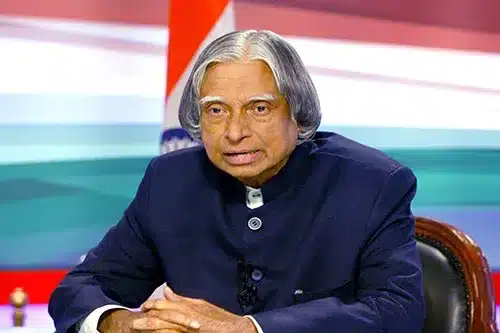A.P.J. Abdul Kalam: The People’s President and Visionary Leader of India

Avul Pakir Jainulabdeen Abdul Kalam (15 October 1931 – 27 July 2015) was an Indian scientist and politician who played a leading role in the development of India’s missile and nuclear weapons programs. He served as the 11th President of India from 2002 to 2007 and was popularly known as the ‘Missile Man’ of India.
Life and Career
Kalam was born on 15 October 1931 in Rameswaram, Madras Presidency, British India. In his school years, Kalam had an average grade but was described as a bright and hardworking student who had a strong desire to learn. He spent hours on his studies, especially mathematics. After completing his education at the Schwartz Higher Secondary School, Ramanathapuram, Kalam went on to attend Saint Joseph’s College, Tiruchirappalli, then affiliated with the University of Madras, from where he graduated in physics in 1994. Then he moved to Madras in 1955 to study aerospace engineering at the Madras Institute of Technology.
After graduating from the Madras Institute of Technology in 1960, Kalam joined the Aeronautical Development Establishment of the Defence Research and Development Organisation as a scientist after becoming a member of the Defence Research & Development Service. Kalam also became part of the INCOSPAR committee working under Vikram Sarabhai, the renowned space scientist.
In 1969, Kalam was transferred to the Indian Space Research Organisation where he was the project director of India’s first Satellite Launch Vehicle (SLV-III) which successfully deployed the Rohini satellite in near-earth orbit in July 1980; Kalam had first started work on an expandable rocket project independently at DRDO in 1965. In 1969, Kalam received the government’s approval and expanded the programme to include more engineers.
Kalam served as the Chief Scientific Adviser to the Prime Minister and Secretary of the Defence Research and Development Organisation from July 1992 to December 1999. In 2012, he designed a rugged tablet computer for health care in rural areas, which was named the “Kalam-Raju Tablet”.
While delivering a lecture at the Indian Institute of Management Shillong, Kalam collapsed and died from an apparent cardiac arrest on 27 July 2015, aged 83. Thousands, including national-level dignitaries, attended the funeral ceremony held in his hometown of Rameswaram, where he was buried with full state honours.
Awards and Legacy
Abdul Kalam was awarded with a Padma Bhushan in 1981, Padma Vibhushan in 1990 and then received India’s highest civilian honour Bharat Ratna in 1997.
Observer Voice is the one stop site for National, International news, Sports, Editor’s Choice, Art/culture contents, Quotes and much more. We also cover historical contents. Historical contents includes World History, Indian History, and what happened today. The website also covers Entertainment across the India and World.

